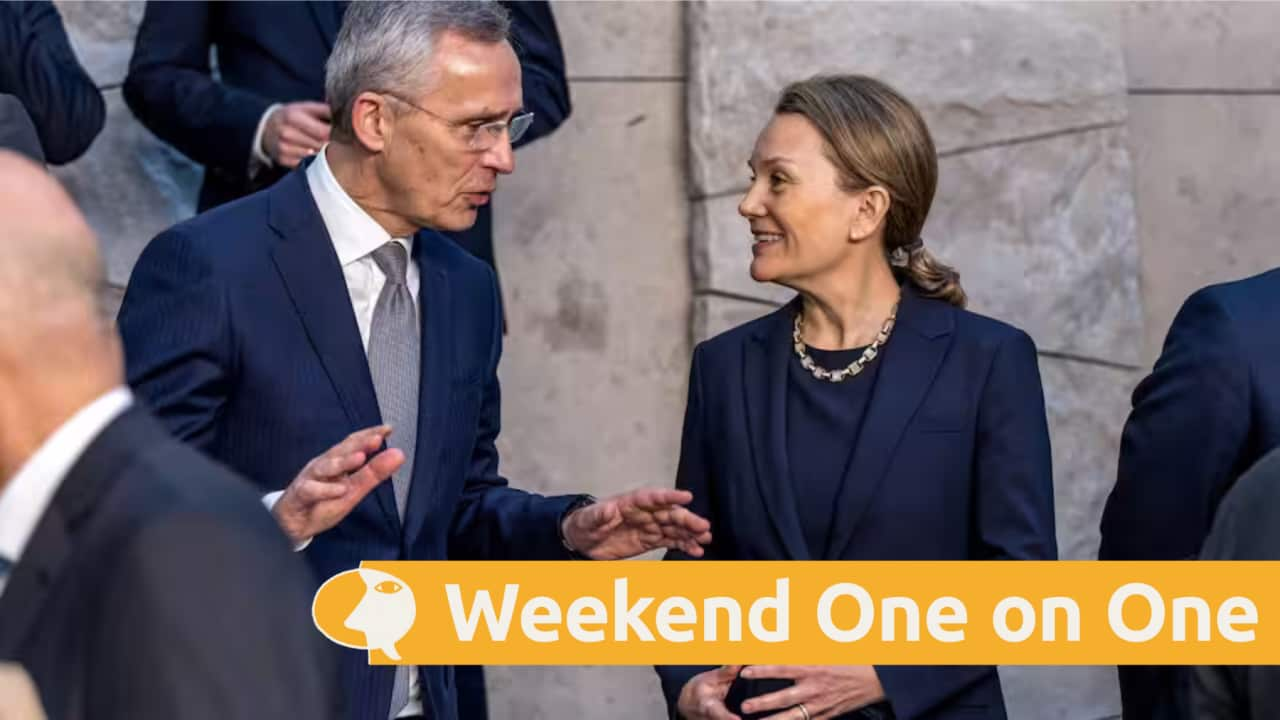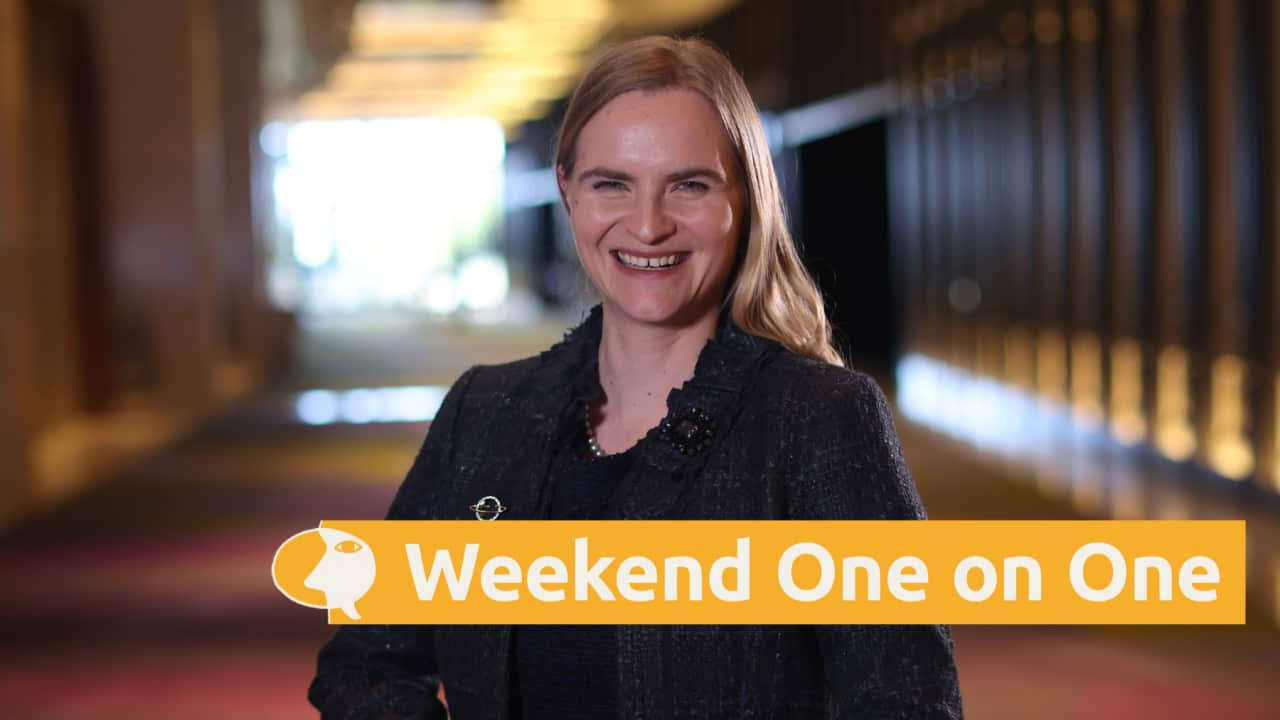TRANSCRIPT:
ANNA HENDERSON: We appreciate that there is so much on the agenda for NATO countries. But I wanted to ask you in a nutshell, what are you hoping this year's NATO meeting will achieve?
JULIANNE SMITH: So we do have a big NATO Summit coming up in mid July. It's the 75th anniversary of this alliance. We'll be celebrating 75 years of working closely with our allies to address a variety of security challenges over seven long decades. But we'll also be welcoming most likely President Zelensky to the summit, talking about allied continued unity and resolve to support Ukraine for as long as it takes.
And we'll also spend part of the summit talking about burden sharing. There's some very good news there. Ten years ago, allies committed to spend 2% of their own GDP on defence. When we made that pledge, three allies met the target. And now today we're going to be somewhere around - by the time we get to July - 20, 21, 22 allies, almost two thirds of the Alliance, spending 2% of their GDP on defence.
So burden sharing, unity around supporting Ukraine, celebrating what the alliance has done for seven decades. But it will be a very busy couple of days.
But we will also be welcoming our friends from the Indo Pacific that includes Australia, but also New Zealand, Japan and the Republic of Korea.
HENDERSON: Now when you do get that chance to host President Zelensky, will Ukraine get that roadmap they've been looking for to NATO membership?
SMITH: Well, the way in which we're describing it is that by the time we get to the summit in July, we will be building a bridge to membership. We do not anticipate extending a proper invitation to Ukraine to join the Alliance at this juncture. The focus for the allies right now remains on getting as much assistance into the hands of our friends in Ukraine so that they can prevail on the battlefield and push Russia out of their territory.
But we will have some deliverables for Ukraine. Those are currently under deliberation here at NATO headquarters, but we will be taking concrete steps to move Ukraine ever closer to the alliance. And of course, we will reaffirm that Ukraine will become a member of this alliance when conditions allow.
HENDERSON: You say when conditions allow, but are we talking, you know, a matter of you know a few years here or potentially looking out to five years or a decade away?
SMITH: NATO allies aren't putting a specific timeline on it. Right now, again, we want to ensure that the war comes to an end. But we also have talked to our friends in Ukraine about the required reforms that a country needs to undertake to become a member of this alliance. Every member that joins the alliance - that includes our friends in Sweden and Finland; they just joined the Alliance over the last year - we have to ask those countries to meet a certain set of criteria. So Ukraine is already moving out on the necessary reforms. They have some more work to do. So between the war in Ukraine and between the necessary reforms. They have some more work to do. So between the war in Ukraine and between the necessary reforms that they need to undertake, that is the focus right now for the members of this alliance. But again, the end state is clear: Ukraine will join this alliance
HENDERSON: What do you say to the frustrations we have been hearing out of Kyiv over recent months that NATO Allies just haven't been providing enough support in terms of munitions to help them actually deal with the threat posed by Russia?
SMITH: Unfortunately, we did have a delay in US support. It took the United States Congress several months to approve the supplemental of over 60 billion US dollars of military assistance. That now has passed through Congress and the United States has moved out with its first package of $1 billion. That includes quite a bit of ammunition, and some provisions for air defence.
We continue to work with our allies in Europe that have stepped up over the last two years. European nations and Canada, they have provided an enormous amount of security assistance to Ukraine. But we have heard our friends in Ukraine loud and clear. They need more air defence, given the attacks that Russia is undertaking in Ukraine. They need more ammunition and they need it urgently. Which is why that remains a top priority here in the NATO alliance. We are looking day in and day out to find additional forms of air defence that we can send to them urgently.
I also want to take a minute and thank Australia for its enduring support for Ukraine. Whether we're talking about economic assistance or humanitarian assistance or other forms of assistance, we here in Brussels really appreciate what Australia has been able to do to support Ukraine.
HENDERSON: It's not enough though clearly, according to those trying to actually wage this battle on the front lines. Secretary Blinken said NATO had emerged bigger, stronger, and more united following the war in Ukraine. If that's the case, how are we now in a situation where Russia is making advances in Ukraine expected to continue in that line over the coming months?
SMITH: We have seen in recent months indications where the Russians will have small victories on the battlefield and where the Ukrainians will have small victories on the battlefield. We have not seen a major shift in the front lines in recent months, but you are correct to say that the Ukrainians need more. They do need more ammunition, they will need more air defence to protect themselves against these indiscriminate attacks on civilians and the relentless attacks on Ukrainian critical infrastructure.
So we will continue supporting them. Secretary Blinken is right: the alliance is stronger and more united around Ukraine. We're not distracted. We're not growing impatient. What I see here, day in and day out at NATO headquarters, is firm resolve to continue assisting our friends in Ukraine so that they can prevail and get Russia out of their territory. It remains a top order priority here, and I think when we get to the summit in July you will feel that as the alliance's top priority.
ANNA: We here in Australia have of course been following NATO's plans for the Indo Pacific as well. Last year, NATO expressed interest in expanding its focus in the Indo Pacific with that Liaison Office floated in Japan. It's my understanding that after a year there's been no progress on that. Does the US believe NATO should play a bigger role in our region, and what's been the holdup with that office?
SMITH: Well, on the NATO liaison office - look, NATO has over 35 partners around the world and there are lots of ways that NATO strengthens its relationship with those partners. Some are in the Middle East, some are in North Africa. We have partners in the Caucuses, and of course we have partners in the Indo Pacific. We also have partners in Latin America, by the way. So in each case, we look at ways to deepen the partnership. Some partners are interested in working with the NATO alliance on cyber-security, on space policy, on disinformation, on emerging and disruptive tech. It takes different forms.
One way that we sometimes strengthen our partnerships is through these liaison offices. We have a few of them spread out around the world. We had looked at the possibility of opening one in Japan. That remains on the table. We continue to look at that as well as a whole array of ways in which we can strengthen the partnership. But the bottom line here is that the signal coming from our friends in the Indo Pacific is strong.
These countries, like Australia, want to deepen their partnerships with the NATO alliance. And similarly, NATO wants to deepen its partnerships in the Indo Pacific. Because what we're facing today in terms of security challenges - they have no geographic boundary. What Australia is coping with in terms of cyber attacks is exactly what our friends in Europe and in North America are grappling with. And so we find great utility in talking about everything from cyber to space to disinformation. Because it's not tied to any geographic location. Both Russia and China are using an array of hybrid tactics. And again, all of us find utility in sharing best practices and insights on how to grapple with those challenges.
HENDERSON: It has been suggested that some NATO members are reluctant to make this move into the Indo Pacific and are fearful of angering China. Is that a consideration?
SMITH: I think - let me put it this way. There's some misinformation floating around around in the world, often put out by either the PRC or Russia, that NATO is somehow eager to expand into the Indo Pacific and become a global alliance. And let me assure your viewers that nothing could be further from the truth. Neither the Indo Pacific partners themselves nor the NATO alliance are actually talking about membership.
We are talking about strengthening our collective toolkit, learning from one another, and enhancing our ability to operate together - but this doesn't go as far as issuing Article Five guarantees for our friends in the Indo Pacific. That's not what's under debate.
So we need to push back on the disinformation that's been put out there by the Russians, by the Chinese, about what these partnerships are all about. But I think one of the reasons they're putting that disinformation out there is because they understand the strength that comes in all of us working together.
HENDERSON: How strong is the NATO alliance, no matter who's elected president of the US later this year, in your view?
SMITH: Look, the NATO alliance has been around for seven plus decades. As I said at the beginning, every US president - irrespective of what political party they were affiliated with - they have all supported the NATO alliance. I think Americans fundamentally understand why NATO was created 75 years ago, and why it's still important for the security challenges that we face.
When I look at polling data in the United States, I see actually an increase in public support for the alliance, and I also see in Congress deep bipartisan support for this alliance. NATO is not a partisan issue. We see Republicans and Democrats supporting the alliance. They come here frequently to visit Brussels together. And I am not worried about American attitudes about the NATO alliance - and I suspect that strong US support will continue.













